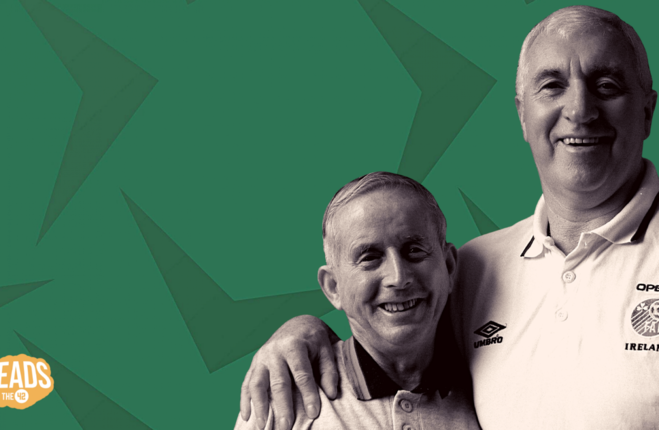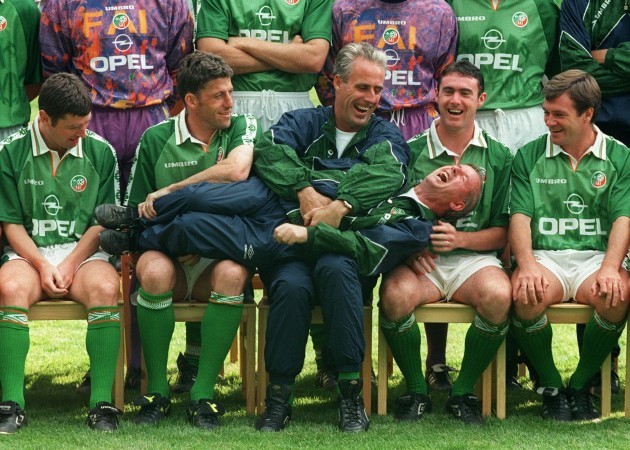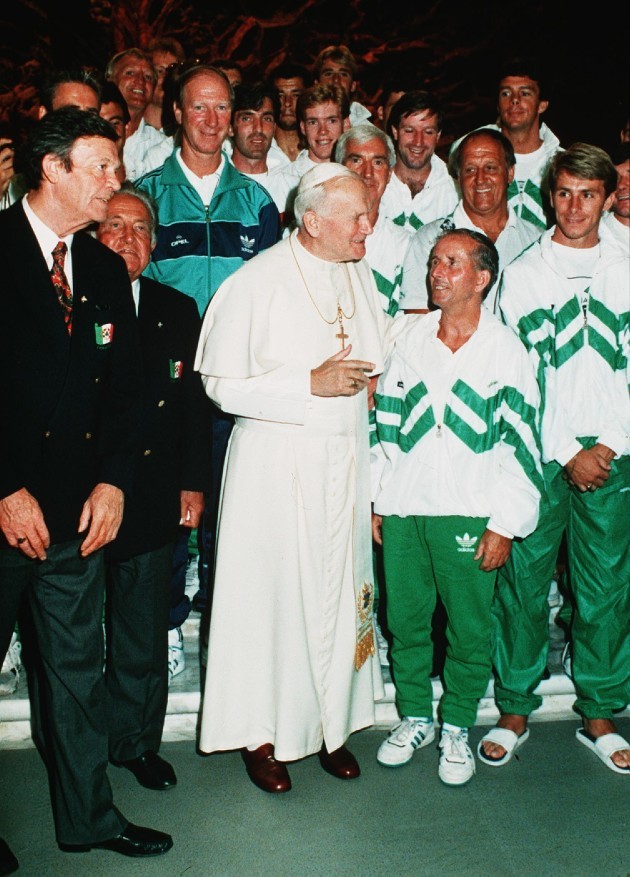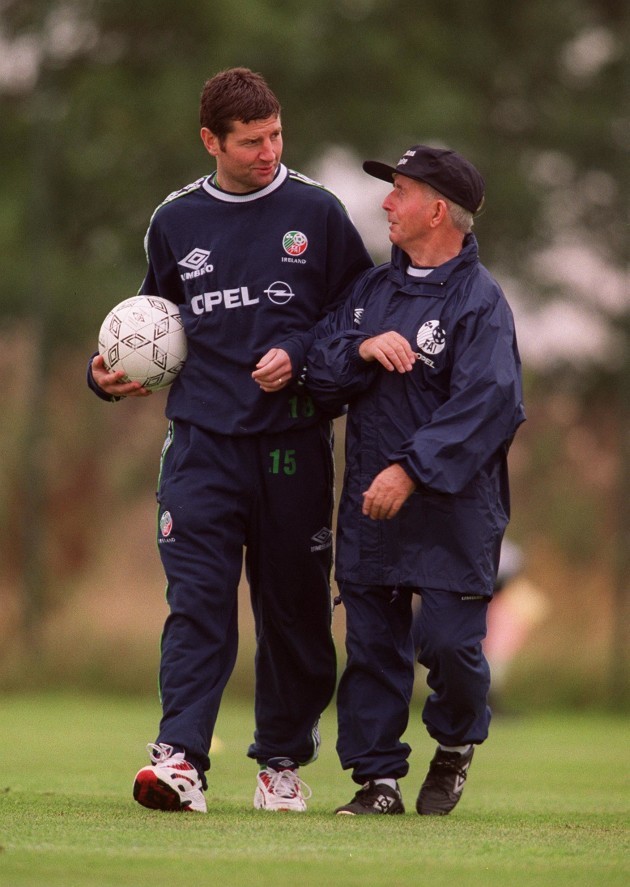THE FAI IS celebrating its centenary, so let’s hold audience with Charlie O’Leary and his golden trove of tack-sharp memories.
“Yeah, so they say”, he chuckles when I tell him he’s been alive for every senior international game played since the FAI was formed.
It’s true: Charlie was born on 1 February 1924, and the Irish Free State played its first Fifa-recognised international match against Bulgaria just under four months later.
97 years on, all of the greatest moments from the country’s football history are looking down on Charlie O’Leary from frames on his living room wall.
Before football claimed him, hurling appealed to him. He was taught in school by Sean Feeney, who played in midfield for Waterford in the 1938 All-Ireland hurling final, and Charlie himself later won a Dublin minor medal for O’Tooles against a Parnell’s team featuring one Charles Haughey.
- For more great storytelling and analysis from our award-winning journalists, join the club at The42 Membership today. Click here to find out more >
A wood machinist by trade, he made hurleys for his friends until he was captured by football and started making memories instead.
“My very first international to watch was in 1938, Ireland versus Switzerland. The reason I was going: Paddy Bradshaw lived 300 yards from me and was picked at centre forward. Those were the days in Dalymount you were allowed sit on the pitch.”
That’s if you made it that far. For the next game against Poland, Charlie and Paddy’s brother had tickets but were told the place was full, so ended up climbing a ladder and watching with countless others from atop the roof of the stand. That image was on a wall in the FAI offices for years.
Charlie O’Leary would become known to the country as Jack Charlton’s kitman – “the little fella” – and, famously, to Pope John Paul II as the brains of the whole Irish football operation – but he first to rose to prominence as a referee.
Having set up street leagues in his native East Wall – a later Irish kitman, Mick Lawlor, played in them – and refereed the games at Fairview Park, he was persuaded into full-time refereeing.
He was the linesman on the first FAI Cup final ever televised, and took charge of the 1972 final between Cork Hibernians and Waterford.
“I have a little boast about this one”, he says. “I’m the only referee to referee the FAI Youth Cup final, the FAI Junior Cup final, the FAI intermediate Cup final, and the FAI senior cup final.
“I would advise any young man to take up refereeing. I owe so much to refereeing. First of all, you get paid to keep fit. I was barely eight stone when I retired, as I was always a fitness fanatic. But just imagine me, I was maybe five foot two in a good pair of shoes, yet I was able to control people. I learned how to control people without being aggressive, or being big-headed.”
Those skills helped to earn him a gig as a liaison officer with visiting international teams in the mid 1980s, first asked to do the job when world champions Italy were flying in for a friendly game at Dalymount in 1985.
“You are in complete control, I don’t want to hear from you”, was the message from the FAI secretary of the time. If the FAI didn’t hear from Charlie, they could hold a straight face in keeping the press at arms length as they went looking for a few World Cup stars around Dublin.
Thus the Italian squad landed in Dublin and instantly demanded that no media be allowed to turn up to watch them train, which meant Charlie had to furtively but no less frantically move the session to the Iveagh Grounds in Crumlin. A friend of his facilitated the move, in return for a signed football.
Then the Italian squad demanded there be coffee available for the players and coaches before, during, and after the session, and that request was met when Charlie found an Italian family in the area with a fish-and-chip shop and a coffee machine they didn’t mind moving.
Later that evening, the players were lounging about in the Shelbourne Hotel when Marco Tardelli approached Charlie.
“He was wearing this gorgeous three-quarter length coat, it was immaculate, and he says to me, ‘Excuse me, is there an art gallery around here?’
“‘You wouldn’t believe it, it’s only a couple of hundred yards this way. C’mon with me.’”
After O’Leary and Tardelli had explored the National Gallery together, they walked back to the Shelbourne via Dawson Street.
“On the way back we came up by the Mansion House. There was a big fisheries exhibition on there, and Tardelli says, ‘What’s going on there?’
“‘Some sort of a fisheries exhibition.’
“‘Can I go in?’
“‘C’mon in.’
“So someone asks me in there, ‘Is that your man Tardelli? Is there any chance of getting the team up here?’
“I asked Marco, and he says, ‘They’d love to come.’
“So we brought them down, the whole team. There was every kind of fish there and they were all munching away. Des Casey was FAI president at the time, and said, ‘Charlie, I’m after looking everywhere for you, this crowd have gone mad about you, you have everything organised for them.
“Then he passed a comment, ‘No doubt that whatever you’re getting, you’ve earned it.’
“I said, ‘Hang on. I’m not getting a penny. I took three days’ holidays for this.’
“‘I’ll sort that out, he said.”
Charlie kept the job, and looked after another 13 visiting teams, the last being Wales in 1986. He went into the Irish dressing room to borrow a pump from Mick Byrne, whom he knew from refereeing Byrne as a player at Bohemians. There he bumped into the new Ireland manager Jack Charlton, whom he also remembered from his refereeing days.
“After I left, Jack asked Mick, ‘What’s he doing?’
“‘He looks after the visiting team, he does this that and the other’, said Mick.
“Jack asked who did that for the Irish team and Mick said, ‘Nobody. I do everything.’
“‘That’s silly, why don’t you ask him?’
“Mick rang me for the next game against Uruguay and that’s how I got mixed in with Jack.”
When we write that Charlie O’Leary has been alive for every Irish international ever played, that’s not to say he’s seen every goal. Under Charlton, he had to disappear into the dressing room a few minutes before half-time to prep the tea and water, and the succession of Irish goals he missed became a running joke to the point he was ushered away down the tunnel if Ireland hadn’t yet scored, in order to break the duck.
Charlton said Charlie O’Leary and Mick Byrne embodied the “essence of the spirit” he wanted in his Irish squad, and it was an essence more carefully crafted than you might think.
After an international game, Byrne would call around to O’Leary’s house, and the pair would drive out to Howth and then walk along the beach, reviewing which of their party tricks worked and which didn’t.
“Mick was an outstanding physio but he is one of the funniest men you will ever meet”, says Charlie.
“We were blessed at that time, the fellas didn’t have those music things on their ears. You see them today on television, and you couldn’t speak to them as they aren’t listening. But we had to make fun for the players.
“For instance, we used to have a big jam jar turned on its edge down the corridor of the hotel with a golf ball, trying to get it into it. There were bets and all on that, and competitions. Then you had question time: we had all sorts of things going for them.
“Then we’d go for a ramble and talk about what went wrong and so on.
“We also used to plan a row between us in front of the players, and the likes of Mick McCarthy and Frank Stapleton would say, ‘Oh, the pair of them are at it again.’ We’d have a few words and then stand head-to-head, and then we’d slip into a different room and be falling around laughing at them.”
Charlie’s bond with the players also allowed him deal with disputes or issues before they could trouble Charlton: “the little fella will sort that out” was a recurring phrase.
“In fairness to Jack, he made me feel important”, reflects Charlie.
“Miss Chisholm, Lord rest her, who ran Irish travel, for her own reasons had us travelling at an unearthly hour of the morning coming back from matches. On one occasion, it must have been 6am at the airport, and this gentleman from the FAI was standing beside me with a small little case. I had everything ready.
“Jack came over and said, ‘Everything organised Charlie? You have all the bags done?’
“‘Yes boss, yes.’
“This gentleman then says to Jack, ‘He hasn’t got mine.’
‘What?’
‘I said, he hasn’t got mine.
“‘Charlie, come here’”, said Jack. “He pointed at yer man’s little bag and said, ‘Charlie, if I ever catch you carrying his case, I’ll f**k you off home.’
“Jack then said to the gentleman, ‘He hasn’t got my bag, never mind yours. And if I ever see him carrying yours, I’ll f**k him off home.’
“Now Charlie, go over there and rest, you are after doing enough.’ And that was the last time he or any of the FAI officials came near me. I never had to argue my case ever again.”
Charlie insists the team’s drinking exploits have been exaggerated, though he himself has remained a pioneer and hasn’t taken a drink in all of his 97 years.
He wasn’t tempted during Euro ’88, as he found himself on the autobahn with a German driver on the way from Stuttgart to Hannover.
“The team were flying to the next match against the Soviet Union. I wasn’t flying, I had to go with the van with the gear in it. There was a German fella driving the van. The Germans gave me a food pack with everything I disliked in it, and there was beer in it.
“He didn’t speak English, but at one point we were coming onto the autobahn and he pulled up to stop for a snack. I took my stuff out and realised what was in it. About 10 yards away was a caravan with the tricolour all over it. I got out, and, fair play to the lad, he said, ‘Is that Charlie?’
“He gave me a Vienna roll about that size, with jam and butter on it. I’ve never forgotten it. Jesus, I’ll never forget that Vienna roll. I devoured it.”
Charlie’s bond with the players from those colour-drenched summers, meanwhile, has held. “I don’t remember falling out once with any of those players. They were smashing, and we were terribly lucky with the group of players we had.
“You know who still comes here pretty often? Paul McGrath. If I could find a nicer person in the whole of Dublin than Paul McGrath, I’d have to search high and low. But that man will never realise how great a footballer he was. He doesn’t believe it. He doesn’t have a clue how great he was. He is an utter gentleman.”
Here’s another.
When Charlton was in charge of the Irish team, his assistant Maurice Setters took the Irish U21s, and Charlie once went along to help out at a game against Portugal at Dalymount.
Given his refereeing background, Charlie was delegated the match day paperwork. Ireland had 17 players but could only name 16 for the match, so asked Setters who should be left out.
Setters picked out the odd man out and pointed, “‘Leave that guy out there. Tell you what. See those empty bottles, get him to fill those empty bottles with water for you.”
Later, the U21s were brought out to Malta to help the Irish team prepare for the 1990 World Cup. They were training on a pitch with a huge, yawning acreage behind the goal, and Charlton told Charlie that he wanted the ball coming back fast as he didn’t want the players getting a rest.
Setters then told Charlie to have one of the U21 players fetch the balls that went too far.
Skip forward to a couple of years later, the senior squad were relaxing at a hotel, and Roy Keane was talking with a couple of younger players.
Then he shouted for Charlie.
“Charlie, tell them about my first match. What was I doing?’
“‘You were filling water for me.’
“‘See? Now, tell them about the time in Malta.’
“‘Says I, ‘He was chasing the ball for me. I was told not to run.’
“‘I’m playing for Forest’, said Roy, ‘and he is telling me to chase the ball for him. And youse are coming along now. He will tell you. I got nothing when I started. I have had to work for everything I’ve got here.’”
“I have to say, he is one of the nicest people I have ever met in my life”, he says of Keane.
“Him and Denis Irwin always roomed together, and there was one thing about them: go into Roy and Denis after training and their gear was packed and folded at the end of their beds. Lovely and neat.
“They used to pick on me for being a Dub but they got a great delight out of it. But I am very proud: only a year ago in the paper he was talking about Mick Byrne. Roy said, ‘Mick Byrne was one of the nicest people I’ve met, as, of course, was Charlie O’Leary.’
“I thought that was lovely, to include me.”
These warm tales of Irish football glory have been recently tinged with a terrible sadness, following the deaths of Charlton, Setters and Alan McLoughlin, another hero of those bewildering days.
“A lovely lad”, Charlie says of Alan, and he left a voice message on his phone the day before he died last month. Our present circumstances, meanwhile, meant he had to watch a stream of Jack’s funeral from his living room; the television screen a jarring contrast to the photos of life’s wild essence framed on the opposite wall.
In the aftermath of the funeral, a letter arrived for Charlie from Jack’s wife, Pat.
“Every Christmas, the first card is from her. She sent me a lovely letter, and the woman was broken-hearted. As I said to her when I rang her, ‘He might have been a famous footballer, but he would have got nowhere without you.’ “She is a lovely person and he was a lovely man. Two very ordinary people, and that’s what you would love about them. There was nothing put on about them.”
A hundred years of Irish soccer has been teaching us that ordinary people are the most likely to do extraordinary things, and that is a firmament in which our guide through this history belongs.
Shine on, Charlie.
- For more great storytelling and analysis from our award-winning journalists, join the club at The42 Membership today. Click here to find out more >




